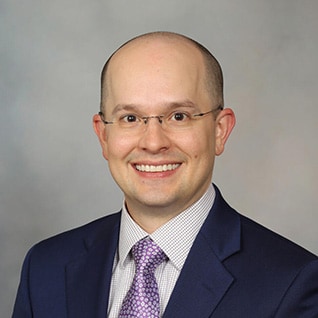Department and Faculty
The Department of Neurology at Mayo Clinic is a highly integrated, collaborative department of adult and pediatric neurologists who specialize in the research, diagnosis, and treatment of more than 500 conditions and diseases affecting the nervous system.
More than 100 specialists provide evaluation and continuing care for patients with neurological diseases. Close collaboration with specialists in pediatric and adolescent medicine, speech pathology, neurosurgery, psychiatry and psychology, pain management, sleep disorders, and physical medicine and rehabilitation offer comprehensive care to Mayo Clinic patients.
The Mayo Clinic Foundation Epilepsy Center provides surgical and medical management options for patients with epilepsy across the age spectrum, supporting the electroencephalography (EEG) practice with a high volume of patients. The average annual procedure volume includes more than 4,000 routine EEGs, close to 2,500 prolonged inpatient and ICU video EEGs, over 900 adult and pediatric monitoring unit admissions, and more than 100 extra- and intra-operative monitoring cases.
Our surgical epilepsy program is a close collaboration among neurologists, neurosurgeons, neuropsychologists, and neuroradiologists with weekly epilepsy surgery and stereoelectroencephalography (SEEG) planning conferences. SEEG monitoring culminates in therapeutic surgeries including resections, disconnections, and minimally-invasive laser interstitial thermal therapy as well as non-resective therapies using neuromodulation devices.
Our busy surgical practice averages more than 50 therapeutic epilepsy surgeries and more than 50 new neuromodulation device implants annually. Our biweekly Neuromodulation Clinic offers management and programming for the full range of peripheral, thalamic, and cortical stimulation closed and open loop devices.
Clinical neurophysiology fellows in the EEG track work extensively with 13 clinician faculty, including five pediatric epilepsy subspecialists, and one non-clinician faculty through the Division of Epilepsy.
Clinical neurophysiology electroencephalography fellows also have the benefit of exposure to robust practices in intraoperative neurophysiologic monitoring (IONM), electromyography (EMG) and sleep medicine. Each of these respective laboratory areas is some of the most active in the country and is staffed by internationally-renown experts in their fields.
From the program director
 Welcome to the Clinical Neurophysiology Electroencephalography Fellowship. Since 1960, our fellowship has been shaping fellows into expert neurophysiologists and leaders in the field.
Welcome to the Clinical Neurophysiology Electroencephalography Fellowship. Since 1960, our fellowship has been shaping fellows into expert neurophysiologists and leaders in the field.
While medical training is often thought of in terms of busy patient loads and countless hours working, the true cornerstone of any medical training program should be education. At Mayo Clinic, you are trained in an educationally-focused environment geared toward growth as a physician. Our balanced individual and collaborative didactic and practical education provided by dedicated staff is unparalleled.
You work every day with staff who are national and international leaders in neurophysiology. Incredible research and networking opportunities are readily available to take advantage of and help foster career interests and connections.
If you have career goals in academic practice you should consider also applying to our Epilepsy Fellowship in combination with our fellowship for a total of two years of training.
In medicine, we all stand on the shoulders of those who came before us to help patients and advance the field for those who come after us. The rich history and world-class practice of Mayo Clinic make that feeling palpable and creates a unique, collaborative environment. Thank you for your interest in our program and in Mayo Clinic.
David Burkholder, M.D.
Clinical Neurophysiology, Electroencephalography Fellowship program director
Faculty
In addition to caring for patients in their clinical practices, Mayo Clinic's faculty members are committed to teaching and facilitating the growth of medical knowledge. You will have direct access to these individuals throughout your training program.
Advisers and mentors
Faculty advising will provide comprehensive educational advice and personal support. Your adviser also serves as a contact point, introducing you and your family to Mayo Clinic and the communities in which you will train.
Visiting professors
Many prominent professors visit Mayo Clinic each year and present their work during lectures. Residents and fellows are encouraged to take full advantage of these opportunities to interact with experts from other academic centers.